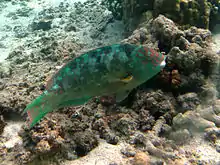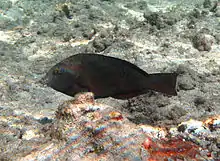Calotomus carolinus
Calotomus carolinus, commonly known as Carolines parrotfish, is a species of marine ray-finned fish, a parrotfish, in the family Scaridae. It is also known as the starry-eye parrotfish, stareye parrotfish, bucktooth parrotfish, Christmas parrotfish or marbled parrotfish.
| Calotomus carolinus | |
|---|---|
 | |
| Calotomus carolinus male specimen | |
| Scientific classification | |
| Kingdom: | Animalia |
| Phylum: | Chordata |
| Class: | Actinopterygii |
| Order: | Labriformes |
| Family: | Scaridae |
| Genus: | Calotomus |
| Species: | C. carolinus |
| Binomial name | |
| Calotomus carolinus (Valenciennes, 1840) | |
| Synonyms[2] | |
| |
Description

The species is about 50 centimetres (20 in) long. The species changes its appearance greatly during the transition to adulthood. Juveniles of the species are typically a mottled orangish-brown, with some pink shading. Adult males of the species are shades of blue or green, and have pink lines radiating from their eyes. Adult females are mottled brown and their eyes bulge out slightly.[3][4] Its jaws consist of pebble-like teeth fused into a beak for eating seaweed, but in juveniles the teeth are not yet fully fused and are visible on the outside of the dental plate.[4][5]
Distribution
Calotomus carolinus has a wide Indo-Pacific distribution from the coast of East Africa, although not in the Red Sea where it is replaced by Calotomus viridescens, through the Indian Ocean to the eastern Pacific Ocean around the Revillagigedo and the Galapagos Islands.[2]
Habitat and biology
Calotomus carolinus can typically be found as a single fish or in small groups, in shallow reefs or lagoons.[3][5] It occurs in subtidal reef flats, lagoons and seaward reefs down to depths of 27 metres (89 ft), or more. Within the wider habitat this species can be found in areas of coral, rubble, seagrass and weeds. It feeds on a variety of benthic encrusting algae, Padina and seagrasses. It is a protogynous hermaphrodite and it may have no initial phase males and there might only be terminal phase males.[2]
Naming and taxonomy
Calotomus carolinus was first formally described as Callyodon carolinus in 1840 by the French zoologist Achille Valenciennes (1795-1865) with the type locality given as the Caroline Islands.[6] When Charles Henry Gilbert described the genus Calotomus in 1890 he designated Calotomus xenodon as its type species, thinking that the genus was monotypic, this was later shown to be a synonyms of C. carolinus.[7]
References
- Russell, B.; Choat, J.H.; Clements, K.D.; et al. (2012). "Calotomus carolinus". IUCN Red List of Threatened Species. 2012: e.T190688A17798889. doi:10.2305/IUCN.UK.2012.RLTS.T190688A17798889.en. Retrieved 15 February 2020.
- Froese, Rainer and Pauly, Daniel, eds. (2019). "Calotomus carolinus" in FishBase. December 2019 version.
- Stender, Keoki (7 October 2012). "Stareye Parrotfish, Calotomus carolinus". Marine Life Photography. Retrieved 7 February 2015.
- Randall, John E. (2010). Shore Fishes of Hawai'i. University of Hawai'i Press. p. 152. ISBN 0824834275.
- "Stareye Parrotfish (Calotomus carolinus)". What's That Fish?. Retrieved 7 February 2015.
- Eschmeyer, William N.; Fricke, Ron & van der Laan, Richard (eds.). "Callyodon carolinus". Catalog of Fishes. California Academy of Sciences. Retrieved 15 February 2020.
- Eschmeyer, William N.; Fricke, Ron & van der Laan, Richard (eds.). "Calotomus". Catalog of Fishes. California Academy of Sciences. Retrieved 15 February 2020.
External links
- Photos of Calotomus carolinus on Sealife Collection
| Wikimedia Commons has media related to Calotomus carolinus. |
| Wikispecies has information related to Calotomus carolinus. |
